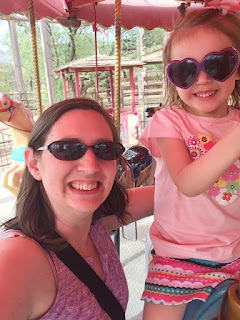Another shocking
death rocked our community last Friday—a recent high school graduate. It seems
like there have been an unusual number of fatal accidents and terminal diagnoses the
last few months. They’ve affected both young and old. Death jolts us with
finality; grief hangs over us like a cloud.
No matter
how old, we’re never ready for our loved ones to die. Even though we know it’s
inevitable, death still surprises us. We wish we could have just one more day
with them. We cry, we question, we rage, and, when we let ourselves, we work
through the grieving process. Yet some people live with hope.
Our bodies
are destined to die, but our souls live forever. For those who follow Christ in
this life, there is the hope of eternity in heaven with Him. We still miss our
loved ones, but we know it will only be a little while until we can see them,
never to be parted again.
Paul wrote
this to the believers in Thessalonica:
“Brothers
and sisters, we do not want you to be uninformed about those who sleep in
death, so that you do not grieve like the rest of mankind, who have no hope.
For we believe that Jesus died and rose again, and so we believe that God will
bring with Jesus those who have fallen asleep in him. According to the Lord’s
word, we tell you that we who are still alive, who are left until the coming of
the Lord, will certainly not precede those who have fallen asleep. For the Lord
himself will come down from heaven, with a loud command, with the voice of the
archangel and with the trumpet call of God, and the dead in Christ will rise
first. After that, we who are still alive and are left will be caught up
together with them in the clouds to meet the Lord in the air. And so we will be
with the Lord forever. Therefore encourage one another with these words” (1
Thess. 4:13-18).
What does
all this mean? Here’s a bite by bite:
Death is not
a permanent state. For the Christian, it’s a passageway to eternity with God.
That’s why when a believer dies, no matter how sudden or tragic or young, other
believers are confident they will see them again.
Christians
base their hope on the fact of Jesus’ resurrection from the dead. We are
looking forward to the Rapture—when Jesus comes back to earth to gather His
children and take us home.
When He
comes, He’s going to bring everyone who died as Christians with Him. What a
reunion that will be!
This is
encouraging news, even though we miss those who’ve died. We still ache to hold
them; the bed still feels empty; we miss their laughter; and the holidays are
never the same, but we have hope.
What about
unbelievers? Not everyone who dies goes to heaven to be with Jesus. The Bible
is very clear. God does not send
people to hell; they choose it
themselves when they turn away from Him. God will not force anyone to spend
eternity with Him in heaven, who does not want to know Him while on earth. He
gives us the freedom to choose.
For the
unbeliever, death is the entrance to eternity without God. Now is the time to decide—glorious
hope, or uncertainty and despair?
My dear
friend, if you don’t know Jesus, I encourage you to check out His story in
Matthew, Mark, Luke, and John of the Bible and decide for yourself.
Was He who
He claimed to be?
Did the
prophecies about Him throughout the Old Testament come true?
Could a mere
man predict specifics about his birth, death, and resurrection and make them all
come true?
Do you want to
be free from sin and guilt?
You can be.
Ask Jesus to reveal himself to you. And learn what it means to hope even when
you’re grieving.
#lifeafterdeath
#grieving #whenJesuscomes #Rapture
#1Thess4:13-18














